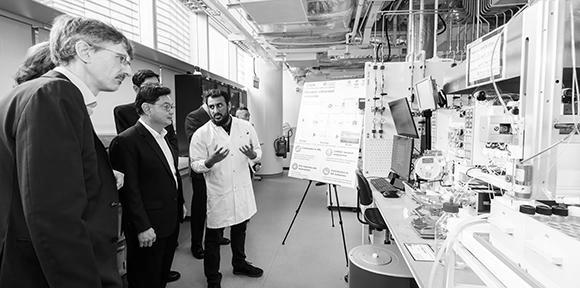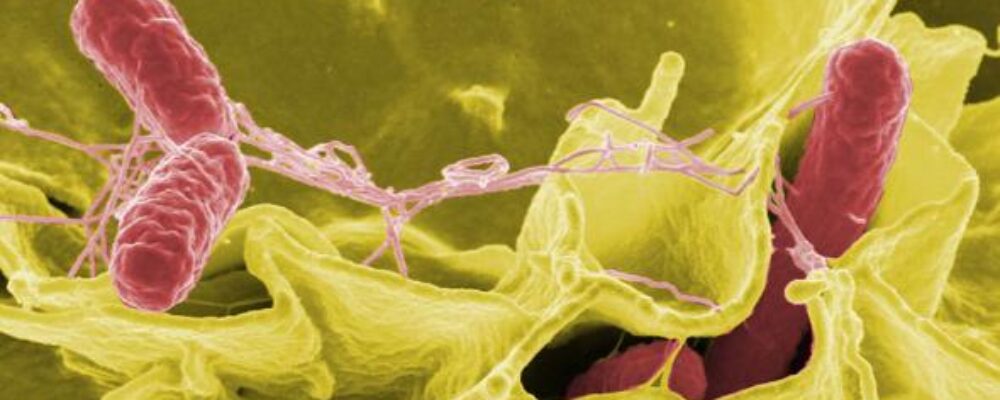The Cambridge Centre for Advanced Research and Education in Singapore (CARES) is hosting two projects that aim to aid Singapore’s business transition away from petrochemicals towards a net-zero emissions target by 2050.
Under the newly launched CREATE Thematic Programme in Decarbonisation supported by the National Research Foundation (NRF), the two projects will investigate non-fossil fuel-based pathways for Singapore’s chemical manufacturing industry and energy systems.
Deputy Prime Minister and Chairman of the NRF, Mr Heng Swee Keat toured the first of three laboratories for the programme to view the technical capabilities required for the various project teams, including CARES’ projects on the Sustainable Manufacture of Molecules and Materials in Singapore (SM3), and Hydrogen and Ammonia Combustion in Singapore (HYCOMBS).
SM3 aims to provide a path to a net-zero, high-value chemical manufacturing industry in Singapore. Its core goal is to address the dependency of producers of performance chemicals on starting materials that typically come from fossil-based carbon sources. The SM3 team hope to develop effective synthetic methods that best convert cheap and abundant fossil-free raw materials into high-value molecules, for use in sectors such as medicines and agrochemicals.
In project HYCOMBS, universities from Singapore, UK, Japan, France and Norway will work together to investigate the underlying combustion process of hydrogen and ammonia to minimise pollutants and accelerate industry innovation.
As part of the lab demonstrations on decarbonisation, CARES showcased an additional ongoing activity with City Energy investigating hydrogen-rich town gas for residential and commercial cooking stoves.
Mr Heng Swee Keat said: “The need to tackle climate change and its impact grows ever more urgent. During my visit to Cambridge CARES (Centre for Advanced Research and Education in Singapore) — Cambridge University’s first and only research centre outside the UK — I witnessed how research and international collaboration are driving innovative solutions to combat climate change, particularly in the area of decarbonisation.
“In just a decade, CARES has established cutting-edge R&D facilities dedicated to decarbonisation projects that not only reduce emissions but also pave the way for a more sustainable future for Singapore. From hydrogen combustion and laser-based combustion diagnostics to the development of cleaner fuels for gas stoves, their work is closely aligned with the goals outlined in our Singapore Green Plan 2030, and achieving Singapore’s net-zero emissions goal by 2050.
“It was encouraging to hear from Director of CARES, Professor Markus Kraft, as he shared how being based in the CREATE facility at the National University of Singapore facilitates interactions with researchers from diverse countries and disciplines. This collaborative and interdisciplinary approach embodies the essence of research — working together to address shared global challenges.”
Since 2013, CARES has been involved in research programmes with Nanyang Technological University and the National University of Singapore as the University of Cambridge’s first overseas centre. One of its early flagship programmes, the Centre for Carbon Reduction in Chemical Technologies (C4T), has investigated areas from sustainable reaction engineering, electrochemistry, and maritime decarbonisation to digitalisation.
By building on this foundation and leveraging the local talent pool, CARES has attracted new partners from international universities and institutes for SM3 and HYCOMBS. This includes EPFL, the Swiss Federal Institute of Technology Lausanne, which will provide skills in the domain AI for chemistry. CNRS, the French National Centre for Scientific Research, the Norwegian University of Science and Technology, and Tohoku University from Japan will contribute technical equipment and key talent in hydrogen and ammonia combustion.
Adapted from a release originally published by CARES.
“The University of Cambridge is a public collegiate research university in Cambridge, England. Founded in 1209, the University of Cambridge is the third-oldest university in continuous operation.”
Please visit the firm link to site






